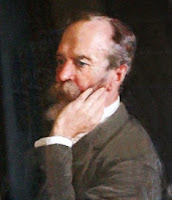“Man lives by habits indeed, but what he lives for is thrills and excitements. The only relief from Habit's tediousness is periodical excitement. From time immemorial wars have been, especially for non-combatants, the supremely thrilling excitement. Heavy and dragging at its end, at its outset every war means an explosion of imaginative energy. The dams of routine burst, and boundless prospects open….
“This is the constitution of human nature which we
have to work against. The plain truth is that people want war. They want
it anyhow; for itself, and apart from each and every possible consequence. It
is the final bouquet of life's fireworks.”— American philosopher,
psychologist, and educator William James (1842-1910), “Remarks at the Peace Banquet,” published in the Official Report of the Universal Peace
Congress, held in Boston in 1904, and in The Atlantic Monthly,
December, 1904
One hundred and twenty years ago this month, William James’ analysis of the psychological roots of war came amid a convulsive
thrust of American power far outside the nation’s continental bounds. It was
the culmination of his rising concern, since the Spanish-American War six years
before, over the possibility that his fellow citizens would be embroiled in yet
another overseas conflict.
Viewing the outcome of those hostilities, Secretary of
State John Hay had pronounced it “a splendid little war.” Even the vast
possessions in the Caribbean and in the Pacific gained by the U.S. at a cost of
only 4,000 casualties, however, did not lessen James’ grave misgivings about
the nation’s new imperial role.
The philosopher’s younger brothers, Wilkie and Bob,
had served in the Civil War, ending up physically and emotionally wounded,
respectively, in the postwar period.
Already troubled by their fate, William began to think
even harder about the war fever that had swept through America again. It was a
line of inquiry that Sigmund Freud would pursue, through different premises and
on a worldwide scale, in his last significant work, Civilization and Its
Discontents (1931).
James went on to argue in the speech and essay from
which I’ve quoted that this instinct for war was so ferocious that it could
only be tamped down by degrees, not abolished instantly. It was a mournful
preview of what developed through the rest of the 20th century, when
technological advances spread destruction on a level that James had never seen
and might not have even contemplated.
I thought of James’ speculations last night while
watching, on TCM, the 1997 biopic MacArthur, starring Gregory Peck. A
highlight of the movie was an extended passage from the victorious American general’s speech, a month after the dropping of atomic bombs, when the
Japanese surrendered in September 1945 to conclude WWII:
“A new era is upon us. Even the lesson of victory
itself brings with it profound concern, both for our future security and the
survival of civilization. The destructiveness of the war potential, through
progressive advances in scientific discovery, has in fact now reached a point
which revises the traditional concepts of war….
“We have had our last chance. If we do not now devise
some greater and more equitable system, Armageddon will be at our door.”
The philosopher and the general would shudder at more
recent developments. The rise of terrorism has increased the chances of
regional wars (e.g., the War on Terror) and failed states so weak that their governments
are no longer in control (Somalia, Afghanistan).
Moreover, the alliance system that MacArthur deemed no
longer sufficient to contain the madness of armed outbreaks. Pointing to a new “axis
of autocracies” (Russia, China, North Korea, and Iran) now cooperating, foreign
correspondent Yaroslav Trofimov asks, in today’s Wall Street Journal, “Has
World War III Already Begun?”
Pray that the answer is no.

No comments:
Post a Comment